Mercedes-Benz GLK-Class: Seats
Important safety notes
![]() WARNING
WARNING
In order to avoid possible loss of vehicle control, all seat, head restraint, steering wheel and rear view mirror adjustments, as well as fastening of seat belts, must be done before setting the vehicle in motion.
![]() WARNING
WARNING
Do not adjust the driver's seat while driving. Adjusting the seat while driving could cause the driver to lose control of the vehicle.
Never travel in a moving vehicle with the seat backrest in an excessively reclined position as this can be dangerous. You could slide under the seat belt in a collision. If you slide under it, the seat belt would apply force at the abdomen or neck. This could cause serious or fatal injuries. The seat backrest and seat belts provide the best restraint when the wearer is in a position that is as upright as possible and seat belts are properly positioned on the body.
![]() WARNING
WARNING
Your seat belt must be adjusted so that you can correctly fasten your seat belt.
Observe the following points:
- adjust the seat backrest until your arms are slightly angled when holding the steering wheel.
- adjust the seat to a comfortable seating position that still allows you to reach the accelerator/brake pedal safely. The position should be as far back as possible with the driver still able to operate the controls properly.
- adjust the head restraint so that it is as close to the head as possible and the center of the head restraint supports the back of the head at eye level.
- never place hands under the seat or near any moving parts while a seat is being adjusted.
Failure to do so could result in an accident and/or serious personal injury.
![]() WARNING
WARNING
The electrically adjustable seats can be operated at any time. Therefore, do not leave children unattended in the vehicle, or with access to an unlocked vehicle. A child's unsupervised access to a vehicle could result in an accident and/or serious personal injury.
![]() WARNING
WARNING
According to accident statistics, children are safer when properly restrained in the rear seating positions than in the front seating position. Thus, we strongly recommend that children be placed in the rear seats whenever possible. Regardless of seating position, children 12 years old and under must be seated and properly secured in an appropriately sized infant restraint, toddler restraint, or booster seat recommended for the size and weight of the child. For additional information, see "Children in the vehicle".
A child's risk of serious or fatal injuries is significantly increased if the child restraints are not properly secured in the vehicle and/ or the child is not properly secured in the child restraint.
![]() WARNING
WARNING
For your protection, drive only with properly positioned head restraints.
Adjust the head restraint so that it is as close to the head as possible and the center of the head restraint supports the back of the head at eye level. This will reduce the potential for injury to the head and neck in the event of an accident or similar situation.
Do not drive the vehicle without the seat head restraints. Head restraints are intended to help reduce injuries during an accident.
![]() To avoid damage to the seats and the seat heating, observe the following information:
To avoid damage to the seats and the seat heating, observe the following information:
- keep liquids from spilling on the seats. If liquid is spilled on the seats, dry them as soon as possible.
- if the seat covers are damp or wet, do not switch on the seat heating. The seat heating should also not be used to dry the seats.
- clean the seat covers as recommended; see the "Interior care" section.
- do not transport heavy loads on the seats. Do not place sharp objects on the seat cushions, e.g. knives, nails or tools. The seats should only be occupied by passengers, if possible.
- when the seat heating is in operation, do not cover the seats with insulating materials, e.g. blankets, coats, bags, seat covers, child seats or booster seats.
![]() When you move the seats, make sure that there are no objects in the footwell
or behind the seats. Otherwise, you could damage the seats and the objects.
When you move the seats, make sure that there are no objects in the footwell
or behind the seats. Otherwise, you could damage the seats and the objects.
![]() The head restraints in the front seats are equipped with the NECK-PRO system
(). For this reason, it is not possible to remove the head restraints from
the front seats.
The head restraints in the front seats are equipped with the NECK-PRO system
(). For this reason, it is not possible to remove the head restraints from
the front seats.
The rear-compartment head restraints can be removed ().
Please contact an authorized Mercedes- Benz Center for more information.
![]() Other topics:
Other topics:
- Cargo compartment enlargement (folding the rear bench seat forward) ()
Adjusting the seats
![]() Vehicles without Memory function: the seats can be adjusted within three minutes
of a front door being opened.
Vehicles without Memory function: the seats can be adjusted within three minutes
of a front door being opened.
The time period starts over again if, within these three minutes, you:
- open or close a front door
- insert the SmartKey into the ignition lock or remove it from the ignition lock
- switch the ignition on or off
If the SmartKey is in position 2 in the ignition lock, the seats can be adjusted at any time.
Depending on the equipment, the seat adjustment buttons are either located on the side of the seat or on the door control panel.
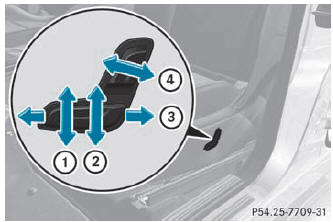
- Seat cushion angle
- Seat height
- Seat fore-and-aft adjustment
- Backrest angle
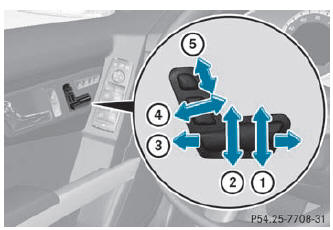
- Seat cushion angle
- Seat height
- Seat fore-and-aft adjustment
- Backrest angle
- Head restraint height
![]() You can store the seat settings using the memory function ().
You can store the seat settings using the memory function ().
Adjusting the head restraints
Adjusting the head restraints manually
Adjusting the head restraint height
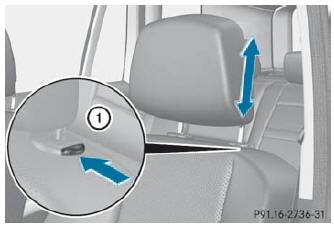
- To raise: pull the head restraint up to the desired position.
- To lower: press release catch : in the direction of the arrow and push the head restraint down to the desired position.
Adjusting the angle of the head restraints
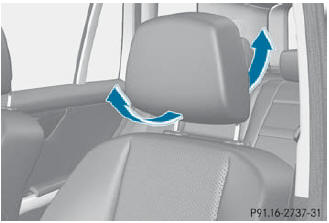
- Push or pull the lower edge of the head restraint in the direction of the arrow.
Adjusting the head restraint height electrically
- To adjust the head restraint height: slide the switch for head restraint adjustment () up or down in the direction of the arrow.
Rear seat head restraints
![]() WARNING
WARNING
For safety reasons, always drive with the rear head restraints in the upright position when the rear seats are occupied.
Keep the area around head restraints clear of articles (e.g. clothing) to not obstruct the folding operation of the head restraints.
![]() WARNING
WARNING
For your protection, drive only with properly positioned head restraints.
Adjust the head restraint in such a way that it is as close to the head as possible and the center of the head restraint supports the back of the head at eye level. This will reduce the potential for injury to the head and neck in the event of an accident or similar situation.
With a rear seat occupied, make sure to move the respective head restraint up from the lowest non-use position and have the occupant adjust the head restraint properly.
Do not drive the vehicle without the seat head restraints installed when the rear seats are occupied. Head restraints are intended to help reduce injuries during an accident.
Adjusting the rear seat head restraint height
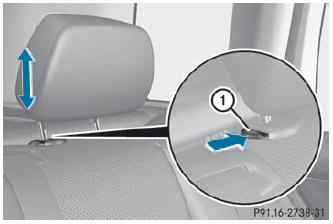
If the head restraint is fully lowered, it is necessary to press release catch 1.
- To raise: pull the head restraint up to the desired position.
- To lower: press release catch 1 and push the head restraint down until it is in the desired position.
Adjusting the rear seat head restraint angle
Adjust the head restraints so that they are as close as possible to your head.
You can only adjust the two outer head restraints.
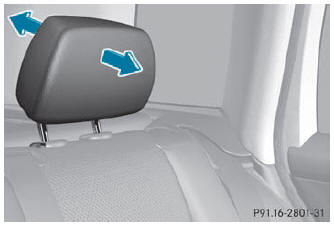
X Pull or push the top of the head restraint until it is in the desired position.
Removing and installing rear head restraints
![]() WARNING
WARNING
Occupants should only travel sitting on seats which have the head restraints installed. In the event of an accident, this reduces the risk of injury for passengers seated in the rear compartment.
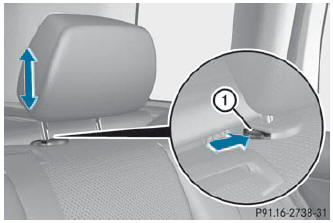
- To remove: pull the head restraint up to the stop.
- Press release catch 1 and pull the head restraint out of the guides.
- To re-install: insert the head restraint so that the notches on the bar are on the left when viewed in the direction of travel.
- Push the head restraint down until you hear it engage in position.
Adjusting the lumbar support
Vehicles without the memory function: You can adjust the contour of the front seats so as to provide optimum support for your back.
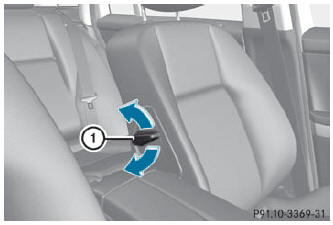
Move adjustment lever 1 in the direction of the arrow until the desired backrest contour is achieved.
Adjusting the four-way lumbar support
Vehicles with memory function:
You can adjust the contour of the front seat backrests individually to provide optimum support for your back.
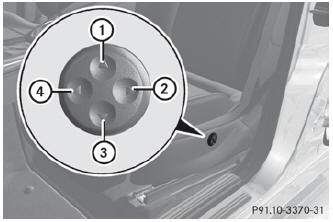
- To raise the backrest contour
- To soften the backrest contour
- To lower the backrest contour
- To harden the backrest contour
Switching the seat heating on/off
Switching on/off
The three red indicator lamps in the button indicate the heating level you have selected.
![]() If the battery voltage is too low, the seat heating may switch off.
If the battery voltage is too low, the seat heating may switch off.
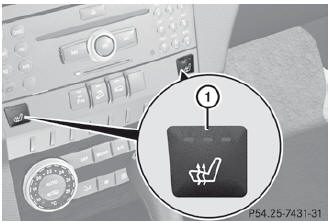
Driver's and front-passenger seat
The system automatically switches down from level 3 to level 2 after approximately eight minutes.
The system automatically switches down from level 2 to level 1 after approximately ten minutes.
The system automatically switches off approximately 20 minutes after it is set to level 1.
- Make sure that the SmartKey is in position 2 in the ignition lock.
- To switch on: press button 1 repeatedly until the desired heating level is set.
- To switch off: press button 1 repeatedly until all the indicator lamps go out.
Problems with the seat heating
The seat heating has switched off prematurely or cannot be switched on. The vehicle's electrical system voltage is too low because too many electrical consumers are switched on.
X Switch off electrical consumers which you do not need, such as the rear window defroster or interior lighting.
See also:
Hood
- Make sure the hood is completely
closed and latched before driving.
Failure to do so could cause the
hood to fly open and result in an
accident.
- If you see steam or smoke coming
from the engine compartment, to
avoid injury do not ...
Suggestions for obtaining service for your vehicle
Prepare For The Appointment
If you’re having warranty work done, be sure to have the
right papers with you. Take your warranty folder. All
work to be performed may not be covered by the
warranty. Discuss additional charges with the service
...

 Correct driver's seat position
Correct driver's seat position